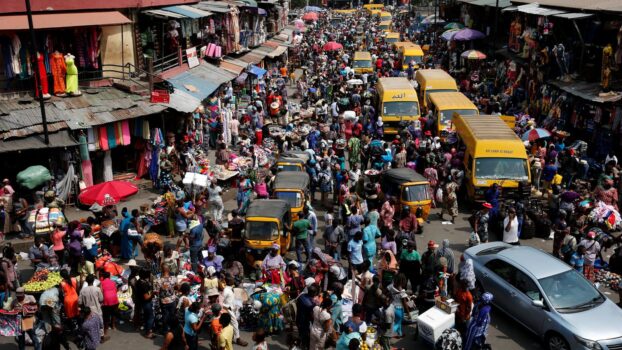 Nigeria’s inflation rate surged to 33.88% in October 2024, up from 32.7% in September, as the nation continues to face escalating costs of goods and services. The National Bureau of Statistics (NBS) attributed this rise to increased transportation expenses and higher food prices, reflecting persistent economic pressures.
Nigeria’s inflation rate surged to 33.88% in October 2024, up from 32.7% in September, as the nation continues to face escalating costs of goods and services. The National Bureau of Statistics (NBS) attributed this rise to increased transportation expenses and higher food prices, reflecting persistent economic pressures.
Year-on-year, the inflation rate climbed 6.55 percentage points from 27.33% in October 2023, underscoring a sharp increase over the past year. On a month-to-month basis, inflation rose to 2.64%, slightly above the 2.52% recorded in September 2024, indicating a higher pace of price increases.
Food inflation hit 39.16% year-on-year in October 2024, up from 37.77% in September. On a month-to-month basis, food prices increased by 2.94%, driven by rising costs of items like vegetable oil, groundnut oil, beef, and products such as Milo and Lipton. The average annual food inflation rate over the last 12 months was 38.12%, reflecting an 11.79 percentage point rise from October 2023.
Core inflation, which excludes volatile agricultural and energy prices, stood at 28.37% year-on-year, up from 22.58% in October 2023. Key contributors to this increase included higher costs for urban transportation, housing rents, dining out, and personal grooming services. On a month-to-month basis, core inflation edged slightly higher to 2.14% in October from 2.10% in September. The average annual core inflation rate over the past year reached 26.12%, up 6.14 percentage points from 19.98% in October 2023.
Urban inflation rose to 36.38% year-on-year in October 2024, compared to 29.29% in October 2023, with a month-to-month increase of 2.75%. The average annual urban inflation rate was 34.52%, up 9.76 percentage points from the previous year. Rural inflation followed a similar trajectory, climbing to 31.59% year-on-year in October 2024 from 25.58% in October 2023. Month-to-month rural inflation stood at 2.53%, slightly higher than September’s 2.39%, with a twelve-month average of 30.24%, up 8.01 percentage points from October 2023.
The latest figures highlight ongoing economic challenges in Nigeria, with both urban and rural populations grappling with rising costs across key sectors.

16 Rivers Lawmakers Defect From PDP To APC, Citing ‘Division’ In Party
Armed Forces Report Major Gains In November, Rescue 318 Kidnap Victims
CBN Introduces New Nationwide Cash-Withdrawal Limits
PDP Issues Expulsion Certificates To Wike, Fayose, 9 Others In Major Party Purge